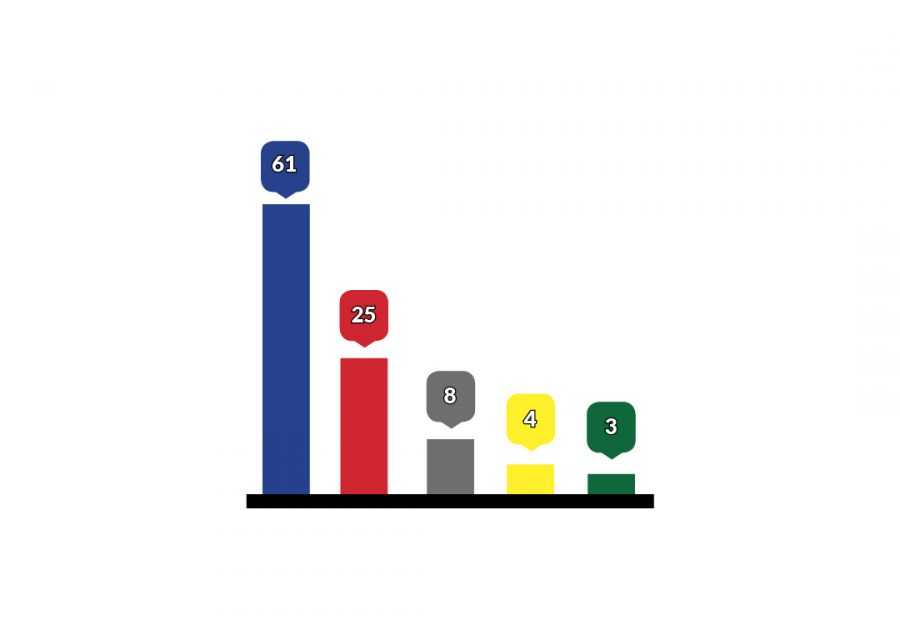A survey conducted by the CALSPEAKS Opinion Research Center at Sacramento State may yield insights into the results of the upcoming California general election.
The survey of 622 likely voters asked about 14 of this year’s 17 ballot propositions. All of the propositions are expected to pass, except for Proposition 62, which would repeal the death penalty.
The survey also shows Democratic presidential nominee Hillary Clinton defeating Republican nominee Donald Trump in the state by a margin of 61-25, with 4 percent voting for Libertarian nominee Gary Johnson, 3 percent voting for Green Party nominee Jill Stein and another 8 percent who are voting for others or are undecided.
Clinton defeated Trump in every demographic measured, except among registered Republicans (among whom Trump won 63-19) and Independents (among whom Trump won 34-33).
49 percent of respondents said they plan to vote in the race for U.S. Senate for California Attorney General Kamala Harris, D-San Francisco.
The poll shows opponent Representative Loretta Sanchez, D-Orange, with 24 percent support, with another 20 percent undecided and 7 percent wanting to vote for someone else.
At a panel on Oct. 20 at the California State Library downtown, two members of the team that compiled the survey — David Barker and Kim Nalder — spoke with U.C. Davis assistant instructor Matt Lesenyie about the results and integrated the survey data into their own election predictions.
Barker said that if so many of the propositions pass, Californians should expect more liberal state laws.
“The takeaway is that unlike literally any other time in California’s history, virtually all of these are going to pass,” Barker said. “Almost all of them are set to sail to an easy victory. By and large, we can expect to see an even more liberal California in a couple of months.”
He qualified, however, that what people said in the survey may not have been entirely accurate considering the volume of propositions this year.
“Some of these poll results may flip and some of these things may go down — we don’t have the experience of having 17 initiatives on the ballot,” Barker said. “There are so many ballot initiatives (voters are) not really paying attention to anything, and so they hear the pollsters and it’s the first time they’ve ever thought about it, and they’re like ‘Oh yeah, that sounds good.’ ”
Democratic presidential nominee Hillary Clinton is predicted to be elected president, but Lesenyie added that he thinks it will be a close election and difficult presidency.
“Based on some of the information gathered this year, we’re watching Clinton’s likeability slide down toward the election,” Lesenyie said. “I foresee the interview next summer — ‘Eh, this isn’t my president. I voted for her reluctantly, and already I can see it’s a mistake.’ ”
“Regardless of what the reasons are, people hate her, and that’s not likely to improve,” Barker added. “I think it’s not likely Clinton wins re-election.”
Nalder offered a more positive vision of Clinton’s potential presidency, pointing out that Clinton tended to have lower approval ratings while running for office.
“There’s lots of women in politics (and) research that shows that people are uncomfortable with women showing ambition — and that’s what running for office is, especially running for the presidency,” Nalder said.
While higher voter turnout of women and Latinos is expected, Barker predicts that millennials will, by and large, not show up.
“I am inclined to believe that … millennials are going to vote as they always do — which is the lowest absolute rate,” Barker said. “Actually, I would expect they will be down from 2008, when a lot of millennials were really, really motivated to turn out for Obama. A lot of millennials are not excited about Clinton.”
Indeed, in the November 2014 midterm elections, only 8.2 percent of Californians aged 18 to 24 cast a ballot, according to KQED News.
The panelists said that there is a 75 percent chance of Democrats taking control of the U.S. Senate or being evenly tied with the Republicans, which would allow whoever is elected vice president to act as a tiebreaker.
For the U.S. House of Representatives, the panel couldn’t make a prediction because polls show the Democrats regaining control, but within the margin of error.
“So at the end of the day, we expect to see a Democratic president, a Democratic Senate and a House that’s basically split,” Barker said. “For those of you who want to see policy get done, there is some hope … if you’re not going to have the two houses with you, the president, the one you want to not have is the House — you can just stick and peel off a few Republican votes.”
Additional reporting by John Ferrannini





























































































































